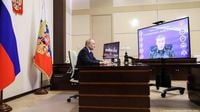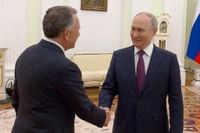In a significant turn of events, Russian President Vladimir Putin has expressed his willingness to engage in peace negotiations with Ukraine "without preconditions," as reported by Kremlin spokesperson Dmitry Peskov on April 26, 2025. This statement came following a meeting between Putin and U.S. Special Envoy Steve Witkoff in Moscow on April 25, where the Russian leader reiterated his readiness for talks, a sentiment he has conveyed on multiple occasions in the past.
Interestingly, this announcement comes just two days after Russia conducted a missile strike on Kyiv, resulting in the tragic deaths of at least 12 civilians and injuring approximately 90 others. The timing of this declaration raises questions about Russia's true intentions, especially as Kyiv has accused Moscow of deliberately stalling peace efforts while simultaneously pushing for maximalist demands.
On April 23, Peskov outlined Russia's core demands during an interview with France’s Le Point, which include territorial concessions from Ukraine, guarantees that Ukraine will never join NATO, and strict limitations on Ukraine's military capabilities. Despite these demands, Ukraine maintains that it is open to negotiations, provided that any peace process respects its territorial integrity and sovereignty. Ukrainian officials have made it clear that discussions regarding territorial issues can only take place after a full ceasefire is established.
It has now been over 45 days since Ukraine accepted a U.S.-proposed 30-day ceasefire initially introduced in March 2025, a plan that Moscow rejected. Instead, Russia has continued its offensive operations along the front lines, undermining claims of a genuine desire for de-escalation. Moreover, a separate partial ceasefire agreement covering Ukraine’s energy infrastructure, brokered during a March 18 call between Putin and U.S. President Donald Trump, has also been repeatedly violated. According to Ukraine’s Foreign Ministry, Russia has breached this energy truce more than 30 times since it came into effect on March 25, targeting critical power infrastructure throughout the country.
In a related development, the Kremlin's announcement coincided with claims from the Russian military that they had successfully recaptured the border region of Kursk. Russian Chief of Staff Valery Gerasimov stated that the last settlement in the Kursk region, the village of Gornal, had been liberated from Ukrainian forces. This claim is part of a broader narrative that the Russian military has made significant gains in recent months.
During the same period, the presence of North Korean troops in Russia has been acknowledged for the first time, with Gerasimov praising their contributions to the operation. According to intelligence reports from South Korean and Western agencies, North Korea sent over 10,000 soldiers to assist Russia in its conflict with Ukraine, particularly during the Ukrainian forces' cross-border incursion into Kursk last August.
Meanwhile, Ukrainian officials have dismissed Russian claims of territorial control, labeling them as propaganda. The Ukrainian General Staff stated, "The statements of representatives of the high command of the aggressor country about the alleged end of hostilities in the Kursk region of the Russian Federation are not true," emphasizing that Ukrainian troops continue to hold positions in the region and are actively conducting operations in Russia's Belgorod region.
On the diplomatic front, Ukrainian President Volodymyr Zelenskyy met with U.S. President Trump at the Vatican just hours before the Kremlin's announcement. Their 15-minute discussion, described by the White House as "very productive," marked the first face-to-face meeting since their contentious exchange in the Oval Office back in February. Zelenskyy characterized the conversation as potentially historic, stating they discussed critical issues including the need for a full and unconditional ceasefire.
During his return flight, Trump expressed skepticism regarding Putin's sincerity in negotiations, citing recent missile strikes on civilian areas. "There was no reason for Putin to be shooting missiles into civilian areas, cities and towns, over the last few days," he remarked, adding that it raises doubts about whether the Russian leader genuinely desires to end the conflict. Trump suggested that Putin might be "tapping me along" and indicated that he could require a different approach, possibly through banking or secondary sanctions.
Despite the ongoing conflict and the complexities surrounding the peace talks, both sides appear to be maneuvering for leverage. While Russia asserts its readiness for negotiations, its military actions tell a different story. The reality is that the war, which has devastated large parts of eastern Ukraine and resulted in tens of thousands of casualties, shows no signs of abating.
As the situation continues to evolve, the international community watches closely, hoping for a breakthrough that could pave the way for lasting peace. The stakes are incredibly high, not just for Ukraine and Russia, but for global stability as well. The coming days and weeks will be crucial in determining whether these negotiations can lead to a meaningful resolution or if the cycle of violence will continue unabated.





